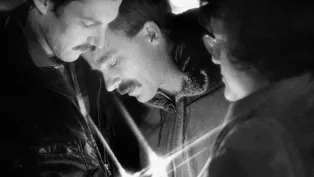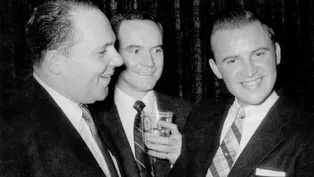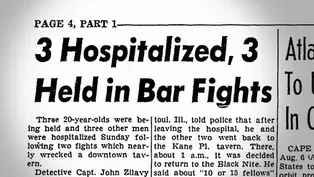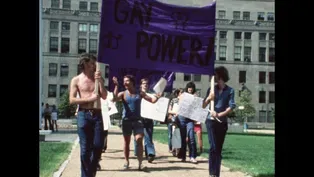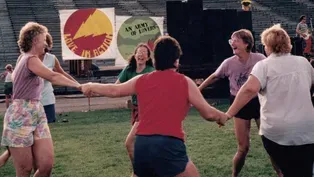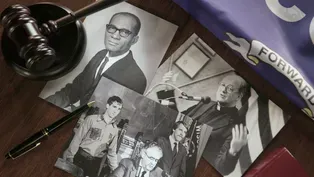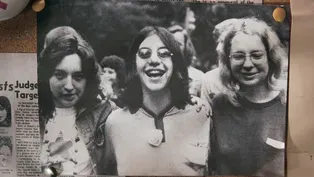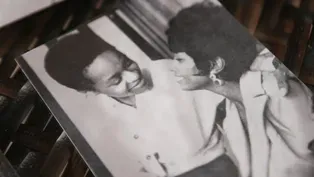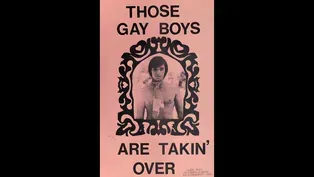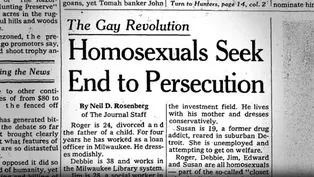Wisconsin Pride
Lou Sullivan
Clip: Special | 4m 58sVideo has Closed Captions
A trans-pioneer from Wauwatosa, WI, Lou Sullivan helped others to live as themselves.
Lou Sullivan had a classic boomer upbringing. For his 4th birthday in 1955 he dressed as Davy Crockett in a coonskin cap. As he grew, he took on looks inspired by the Beatles, Bob Dylan and the man whose name he took on, Lou Reed. Assigned female at birth, Sullivan advocated tirelessly for his own gender-affirming care and surgery and for those who followed through the group he founded, FTM.
Problems with Closed Captions? Closed Captioning Feedback
Problems with Closed Captions? Closed Captioning Feedback
Wisconsin Pride is a local public television program presented by PBS Wisconsin
Funding for Wisconsin Pride is provided by Park Bank, SC Johnson, the Greater Milwaukee Foundation, the Evjue Foundation, the charitable arm of the Capital Times, TruStage, the New Harvest Foundation,...
Wisconsin Pride
Lou Sullivan
Clip: Special | 4m 58sVideo has Closed Captions
Lou Sullivan had a classic boomer upbringing. For his 4th birthday in 1955 he dressed as Davy Crockett in a coonskin cap. As he grew, he took on looks inspired by the Beatles, Bob Dylan and the man whose name he took on, Lou Reed. Assigned female at birth, Sullivan advocated tirelessly for his own gender-affirming care and surgery and for those who followed through the group he founded, FTM.
Problems with Closed Captions? Closed Captioning Feedback
How to Watch Wisconsin Pride
Wisconsin Pride is available to stream on pbs.org and the free PBS App, available on iPhone, Apple TV, Android TV, Android smartphones, Amazon Fire TV, Amazon Fire Tablet, Roku, Samsung Smart TV, and Vizio.
- Along with their radio program, Gay People's Union established GPU News , A newspaper written by and for LGBTQ+ people.
The publication found a national audience and introduced readers to singular voices, like columnist and trans pioneer Lou Sullivan.
- Brice Smith: Lou Sullivan wrote articles on historical figures.
People with whom he identified.
People who are assigned female at birth but had lived as men.
He very much recognized and appreciated how important history is to an individual's identity.
- Lou Sullivan grew up in Wauwatosa, Wisconsin.
His fourth birthday party was a memorable day.
- Brice Smith: It was a Davy Crockett-themed birthday party.
Lou always remembered that when he put on that Davy Crockett costume, he really felt like he was Davy Crockett.
His life intersected with so many of the key moments in the Baby Boomer generation.
He liked to brag that he was the most "Beatled" kid at his school 'cause he knew more about The Beatles than anyone.
His idol became Bob Dylan.
And he would wear these cowboy boots, bell-bottom jeans.
As he moved into his early twenties then, his idol became, incidentally, his namesake.
[laughs] The rock star Lou Reed.
- Lou Sullivan donned a leather jacket, embraced a new identity, and began to live life as a gay trans man.
- Brice Smith: A lot of people assigned female at birth were really into these pop culture icons: the Beatles, Bob Dylan, Lou Reed.
But what was different with Lou is that he both wanted these men, and also wanted to be them simultaneously.
So, the lines between desire and identification were very blurred for him.
- Sullivan underwent a mastectomy and received hormone therapy while considering a gender-affirming surgery for years.
And although the surgery was an established medical practice by the 1970s, Lou Sullivan's unique request was denied.
- Lou Sullivan: I was told that my case was too unusual, that they had never heard of a female-to-male who wanted to be a gay man, that they did not want to be the first to operate and deal with such a person.
- Brice Smith: His youngest brother, Patrick, died in a motorcycle accident.
This is when he realized, "You know what?
"We don't have that long.
"If I were lying on my deathbed, "I would regret not transitioning.
This is something I've got to do."
- For nearly a decade, Sullivan pleaded the case to medical professionals that someone could be a trans man and also a homosexual.
And in 1986, he finally prevailed.
A doctor in San Francisco agreed to perform the gender-affirming surgery, charting new territory in the medical field.
- Brice Smith: As soon as he found someone willing to help him, then he just shouted from the rooftops and spread the word.
It spread like wildfire through the trans community.
- Lou Sullivan published a groundbreaking guidebook to help both doctors and trans people bridge the gap between sexual orientation and gender identity.
Sullivan also shared first-hand experiences with the trans community through his female-to-male newsletter.
- Lou Sullivan: As long as no one else is talking about it, it's going to be forever silent, and no one is going to hear about it.
I wanted to connect with people in feeling like an honest person with people.
I just don't see any reason to hide it.
- Brice Smith: Lou was able to be there for countless trans men.
There's just nothing like moving in the world and having everyone see you as you know you should be seen, as you have known yourself to be for so long.
- Lou Sullivan: I spent so many years trying to figure out a place in society.
Finally, I could breathe.
It felt so good.
Video has Closed Captions
Clip: Special | 5m 57s | Responding to the AIDS pandemic took political will and new social action led by ACT-UP. (5m 57s)
Video has Closed Captions
Clip: Special | 2m 9s | Gay bars once were the only place you could be gay, and it was still risky. (2m 9s)
Video has Closed Captions
Clip: Special | 4m 46s | Years before Stonewall, a Milwaukee bar’s patrons fought back against homophobic attacks. (4m 46s)
Video has Closed Captions
Clip: Special | 2m 19s | Gay Peoples Union nurtured LGBTQ+ life in 1970s Milwaukee. (2m 19s)
Gay Press and Leaping La Crosse News
Video has Closed Captions
Clip: Special | 5m 27s | A diverse gay press united LGBTQ+ people. La Crosse had its own lesbian newsletter. (5m 27s)
Video has Closed Captions
Clip: Special | 11m 6s | Wisconsin led the nation in enacting anti-discrimination laws for gays and lesbians. (11m 6s)
Video has Closed Captions
Clip: Special | 5m 2s | The nation’s first out lesbian candidate for office ran to protest anti-LGB school policy. (5m 2s)
Video has Closed Captions
Clip: Special | 5m 25s | Milwaukee lesbian couple sought marriage equality in the Seventies. (5m 25s)
Video has Closed Captions
Clip: Special | 2m 37s | The Madison Alliance for Homosexual Equality was Wisconsin’s first LGBTQ+ advocacy group. (2m 37s)
Preview: Special | 30s | Remarkable stories of fighting injustice define a pivotal LGBTQ+ era in Wisconsin. (30s)
Providing Support for PBS.org
Learn Moreabout PBS online sponsorshipSupport for PBS provided by:
Wisconsin Pride is a local public television program presented by PBS Wisconsin
Funding for Wisconsin Pride is provided by Park Bank, SC Johnson, the Greater Milwaukee Foundation, the Evjue Foundation, the charitable arm of the Capital Times, TruStage, the New Harvest Foundation,...
